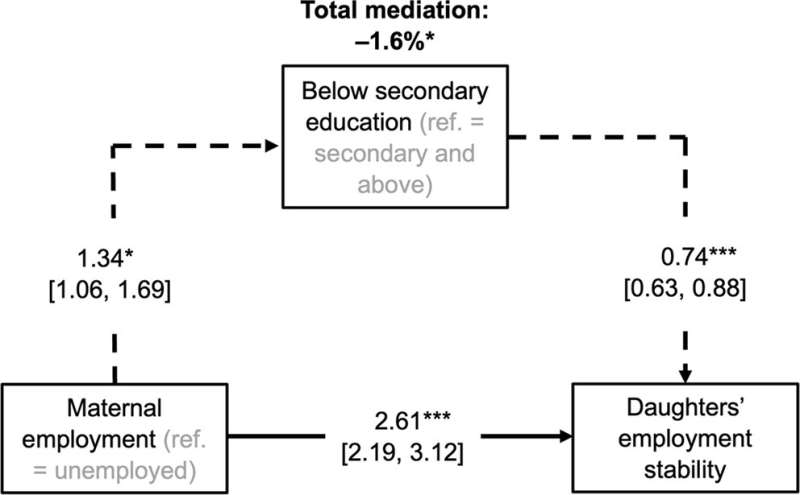Egyptian mothers' employment early in children's life may help their daughters stay in work

Mothers in Egypt, where women's employment remains "concerningly low," can play an important part in shaping their daughters' employment stability from a young age, says new research by Lancaster University.
The study, by Dr. Mariam Abouelenin and Professor Yang Hu, of Lancaster University, looked at Egyptian mothers' employment during their daughter's adolescence and found that it could have a long-lasting impact on their daughters' employment stability in adulthood.
The research, thought to be the first study to look at women's labor force attachment from an intergenerational perspective, also found that mothers are more effective role models than fathers for their daughters in Egypt.
The fathers' employment was not associated with their daughters' employment stability whereas the mothers' employment was.
And, adds the research, mothers' employment in the public or private sector bolsters daughters' aspirations and opportunities to work and remain in the same sector. Given recent public sector downsizing in Egypt, this result means that having a mother who worked in the public sector has become ever more important in helping daughters have stable public sector employment.
The study, "Maternal Employment Shapes Daughters' Employment Stability in Egypt: Evidence for the Intergenerational Transmission of Labor Force Attachment" is published today in the journal, Sex Roles.
The paper looks at how women's employment stability is shaped by whether and in which sector their mothers were employed as they grew up, using data that traced the women's employment over a period of 12 years.
It focuses on the "understudied" context of women's labor force participation in Egypt and is the first study of its kind to look at women's labor force attachment from an intergenerational perspective.
"The key finding of this study was the strong intergenerational relationship between having an employed mother and a daughter's employment stability," said Dr. Abouelenin.
"Daughters whose mothers were employed were more than twice as likely to have stable employment compared to daughters whose mother were not employed."
Dr. Abouelenin, who works in the Center for Family Justice Research at Lancaster University, said the findings suggest the importance of interventions early in life to help support women's stable employment.
The findings show that support for Egyptian mothers' labor force participation not only helps empower the mothers themselves but also has far-reaching implications for promoting gender equality at work a generation down the line.
Dr. Abouelenin added, "We felt this study was important because women's employment stability is an important yet understudied dimension of women's economic empowerment.
"A common trend that we are seeing in Egypt—and many Middle East and North Africa countries—is a rapid increase in female education attainment and the closing of gender gaps in education. But women's educational success is not translating into their participation in the labor force."
Going forwards, says Dr. Abouelenin, future interventions aimed at increasing women's labor force participation in Egypt should focus on ensuring that mothers are informed of how their employment, or lack thereof, can impact on their daughters' labor force attachment.
"Future interventions are needed to also break sectorial segregation in the Egyptian labor market," she added. "One area worth targeting is the intergenerational relationship between mothers and their daughters."
More information: Mariam Abouelenin et al, Maternal Employment Shapes Daughters' Employment Stability in Egypt: Evidence for the Intergenerational Transmission of Labor Force Attachment, Sex Roles (2022). DOI: 10.1007/s11199-022-01326-w
Journal information: Sex Roles
Provided by Lancaster University





















